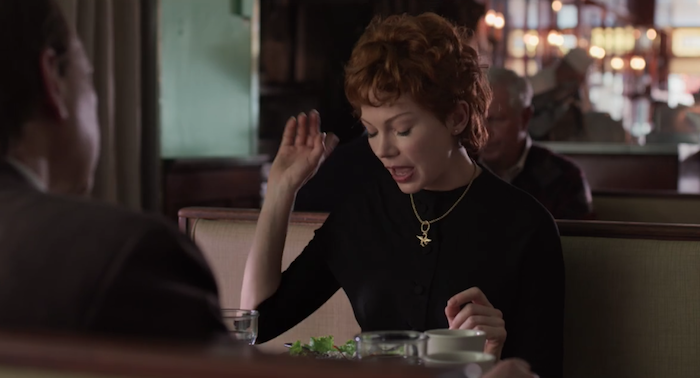Previously Ep 1 - "Life is a Cabaret"

No, no, I know who he is. The one with the hats.
by Nathaniel R
The premiere episode of Fosse/Verdon took place (mostly) in 1971 when Fosse was rehearsing Cabaret but linear storytelling isnt remotely 'on trend' in TV miniseries right now, so we're hopping backward for Episode 2 to 1955 when Gwen Verdon was flush from her breakout Tony-winning turn in "Can-Can" and cast in "Damn Yankees". At a lunch meeting Hal Prince (Evan Handler) tries to sell that Broadway it girl (Michelle Williams) on his choice of choreographer. Gwen isn't sold, wiggling her hand dismissively for Fosse's most famous recurring choreographic accessory, the hat. It's but one of many fine gestural moments from a truly inspired Michelle Williams. Though it's too soon to know, she may well be giving us the performance of her career...

Whatever qualms one might have about the show (Chris had plenty with the premiere) Williams is the show's most transporting element. Wearing the Broadway superstar's voice and mannerisms like a second skin, she dives deep into character psychology. By now praising actors for believably becoming a familiar star is the laziest possible form of praise (see also the past twenty or so years of the Oscars). What's more impressive is how effortless Williams makes that mimicry, knowing its just stylish surface, like a wrist flick or a hip jut. To hear her speaking for Fosse to dancers and confused producers in both episodes, is revelatory. It suggests, not that she was the secret genius behind his fame (a reductive misogyny-corrective take, that we'd argue does both Fosse and Verdon a disservice -- they were both geniuses) but that her genius was, in part, the interpretation and translation of his. And isn't this what all the best dancers are for choreographers and all the most talented actors are for directors? They're not empty tools of the craft or stand-ins for the "author," but true collaborators and transcendent vessels.
Two episodes in, Fosse/Verdon unfortunately isn't as impressive as Williams. One immediate problem is the instant and frequent reminder (by way of those tap-dancing inserts to Fosse's youth) that All That Jazz (1979) already delivered the definitive (auto) biopic. Sam Rockwell, a fine actor who's proven time and again that he has a dancer's soul and knows how to act with his body (crucial for success in this role), struggles in the shadow of that stone-cold masterpiece. Rockwell moves better than Roy Scheider in All That Jazz but he's so dour and catatonic at times in closeups (does his genius give him a headache?) that it's tough to believe in Fosse's infamous success as a womanizer. Where is the innate charisma and devilish charm that we know Rockwell possesses (from previous roles) and that Scheider exuded so vibrantly in that 1979 picture?

You'll be smiling so wide, and dancing so magnificently. They'll think it's a musical. But you'll know. And I'll know. That's what we do, though isn't it? We take what hurts and we turn it into a big gag. We're singing and we're dancing. The audience is yukking it up. They're laughing so hard they don't realize that all that they're laughing at is a person in agony.
The script is, thus far, skimping on the sense of humor that Fosse and Verdon both obviously had and focusing on the heartbreak of infidelity. And heartbreaking it is, sure. But troubled marriages are nowhere near as original and compelling as raison d'etre for a miniseries as the collaboration of two unique artists in their prime.

ERP!
Still, Fosse/Verdon is a treat for lovers of showbiz history with its recreations of famous film and theater sequences. In episode two, it manages to marry the routines to the emotional narrative in smart ways, something that was a bit lacking in the premiere.

The twin jewels of the second episode are Gwen & Bobby's stealth mutual-audition duet on "Whatever Lola Wants" and the first performance of "Who's Got the Pain?" (both classic numbers from Damn Yankees!). The first is a beautifully careful get-to-know-you routine (from both actors, Rockwell looser and more charismatic while dancing). And both dance sequences are working overtime to reveal character and theme while also providing musical theater pleasure. Williams intricate emotional maneuvering around powerful men whether rehearsing or negotiating, is something else again; even when Gwen is nervous or angry or annoyed, she's rifling through all the tools in her arsenal (sex appeal, quick smarts, innate sense of play-acting, and professional ease and confidence in her own gift) in service of complex end goals: keep the part, sell the number, appease the man's ego, and above all else contribute to making great art.
The latter surely thrills Williams as much in 2019 as it did Gwen Verdon in 1955.